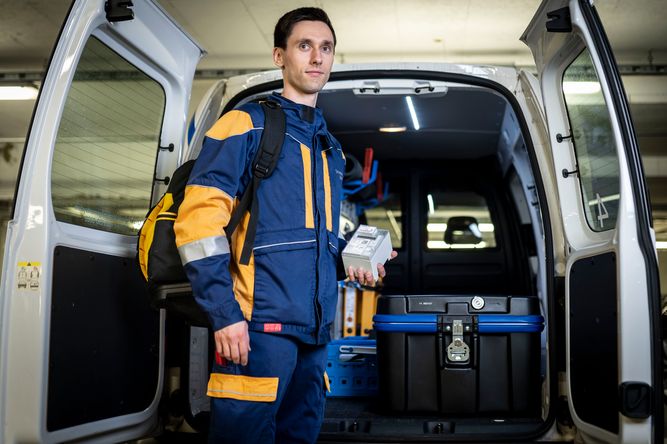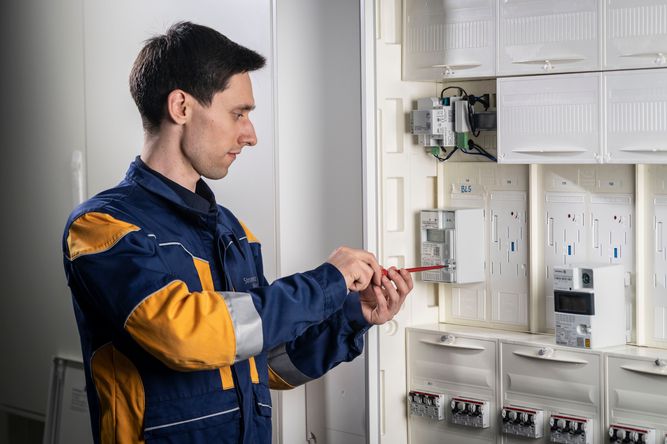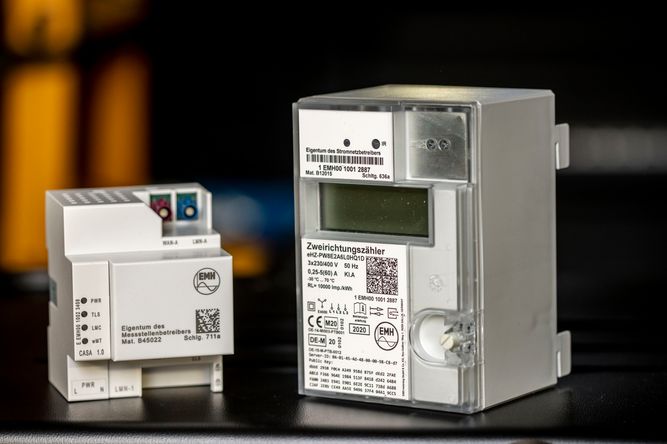First smart electricity meter installed uon the EUREF-Campus
06.10.2020
Smart meter rollout started at Berlin
Smart electricity meters are now being installed in Berlin. Today, the first of these smart metering systems was installed on the premises of BLS Energieplan, located on the EUREF-Campus in the Schöneberg district of Berlin.
Thomas Schäfer, CEO of Stromnetz Berlin, had the following to say: "Smart meters are set to change the energy world. They are an important and necessary step for the implementation and digitalisation of the energy transition. Stromnetz Berlin has prepared extensively and intensively for the start of the roll-out. I am very pleased that we were able to put the first smart meter in Berlin into service here on the EUREF-Campus, a hotspot for innovation and digitalisation."
Reinhard Müller, CEO of EUREF AG: "Stromnetz Berlin and the EUREF-Campus have been cooperating for many years on projects and products for the mobility and energy transition and for climate protection. We are both committed to using renewable energy sources and new energy storage systems, and to consistently integrating advanced technologies. We are pleased to be a showroom and a platform for the energy transition at today's roll-out."
State Secretary Dr Frank Nägele, responsible for administration and infrastructure renewal within the Senate Chancellery, welcomed the start of the smart meter roll-out: "I am very pleased to be a guest at today's smart meter roll-out by Stromnetz Berlin at BLS Energieplan GmbH's premises on the EUREF-Campus. The installation of smart metering systems creates vital infrastructure for the smart city, making it an important contribution to sustainable urban development. I welcome this project as an example of how politicians, government bodies and network operators can work together to employ smart technologies in Berlin."
Wolfgang Sturm, Managing Director of BLS Energieplan, is convinced of the benefits of the new technology: "As an engineering company committed to innovation, we are pleased with the roll-out of smart meter gateways as an essential component for the digitalisation of the electricity grid and customers, which is to say generation and consumption. The roll-out of smart meter technology in Germany makes it possible for the first time to receive renewable electricity – at the same time as generating it – over the electricity grid where the electricity is not generated directly in or on the building. Moreover, the process is transparent and verifiable. For the EUREF-Campus, this forms the basis for procuring the electricity obtained by lessees from renewable sources located outside the campus through pure balancing groups. This makes it possible for companies doing business on the EUREF-Campus to meet not only their heating and cooling needs but also their operational electricity needs in a climate-friendly manner."
The market declaration of the German Federal Office for Information Security (BSI) was issued on 31 January 2020. This set out the technical feasibility for the installation of smart metering systems and created the necessary conditions for the legally prescribed smart meter roll-out in Germany. As the local distribution system operator and responsible metering point operator in the capital, Stromnetz Berlin is responsible for overseeing the smart meter roll-out. Thomas Schäfer is convinced his company is well equipped for it. He points out that Stromnetz Berlin has not only developed new processes and associated IT applications but has also created systems to control installations such as heat pumps and charging stations for electric cars, which together with smart metering systems form the basis for a future smart grid.
Customers with an annual consumption between 6,000 and 100,000 kilowatt-hours (kWh) will be the first to be equipped with smart meters in the coming years. They will be informed in due course about the installation and costs. The number of smart meters installed will rise continually from 2021 onward. In future, the devices will also include additional features. The legislation provides that in the first three years after the start of the roll-out, 10% of the customers classified according to consumption groups are to be equipped with smart metering systems. Stromnetz Berlin will meet this requirement.
This legislation will offer customers the benefits of the new technology, specifically when it comes to higher transparency regarding electricity consumption. Smart meters will help customers use energy more efficiently in order to effectively reduce their electricity consumption. In the longer term, they – together with automatic control devices – will also facilitate smart grid operation.
For customers with relatively low electricity consumption, the legislation provides for a different type of meter technology. the modern metering device. In the last few years, Stromnetz Berlin has already installed more than 260,000 of these metering devices in Berlin.
Terminology:
Modern metering devices: These are digital electricity meters that give more insight into electricity consumption than conventional meters. Along with the current meter reading, they display detailed consumption data for various usage times, current electrical power consumption, and daily, weekly, monthly or yearly electricity consumption for the last 24 months.
Smart metering systems: These consist of a modern metering device and a communication unit (smart meter gateway) and are commonly referred to as smart meters. The communication unit enables the system to acquire and convey important grid and consumption data. Smart metering systems are a basic component of smart electricity grids. They distribute the measurement data captured by the meter to the authorised energy company in encrypted form. This eliminates the need for annual electricity consumption readings.



